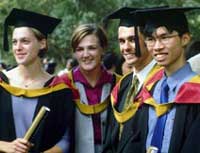Chemistry, Biochemistry and Microbiology of Food - FOOD8000
Faculty: Faculty of Engineering
School: School of Chemical Engineering
Course Outline: School
Campus: Sydney
Career: Postgraduate
Units of Credit: 6
EFTSL: 0.12500 (more info)
Indicative Contact Hours per Week: 6
Equivalent: FOOD1517
CSS Contribution Charge: 2 (more info)
Tuition Fee: See Tuition Fee Schedule
Further Information: See Class Timetable
View course information for previous years.
Description
Water: physical chemistry; water activity and molecular mobility. Carbohydrates: sugars; starch, gelatinisation, modification; hydrocolloids. Proteins: amino acids; protein formation using DNA templates, structure, functional properties, denaturation; Maillard reaction. Lipids: fatty acids; triglycerides, melting profile; lipolysis; oxidative rancidity. Enzymes: reaction categories; intermediary metabolism and metabolic pathways; respiration; enzyme kinetics; factors influencing enzyme reactions; denaturation; and specific enzymes (polyphenol oxidase, lipase, lipoxygenase, polygalacturonase). Animal and plant cell structure and multiplication. Microbiology: overview of micro-organisms important for food production, spoilage, pathogenicity; kinetics of microbial growth and destruction.
Requisite knowledge and relationships to other courses
Assumed knowledge: At least one subject in inorganic and one in organic chemistry
This course is a prerequisite for FOOD8010 Food Preservation and FOOD8230 Food Microbiology.
This subject may be taken concurrently with the subjects it services. There will be opportunity for students to discuss concepts from those other subjects.
This subject is NOT available to students in the Food Science and Technology Program 3060.
This subject is not suitable for students who have studied Biochemistry.
Textbooks:
Owen R. Fennema (1996), Food Chemistry, Marcel Dekker, Inc. New York.
M.R. Adams and M.O. Moses (1995). Food Microbiology, The royal Society of Chemistry, Cambridge.
Recommended Texts:
Campbell-Platt Geoffrey (2007) Textbook of Food Science and Technology.









